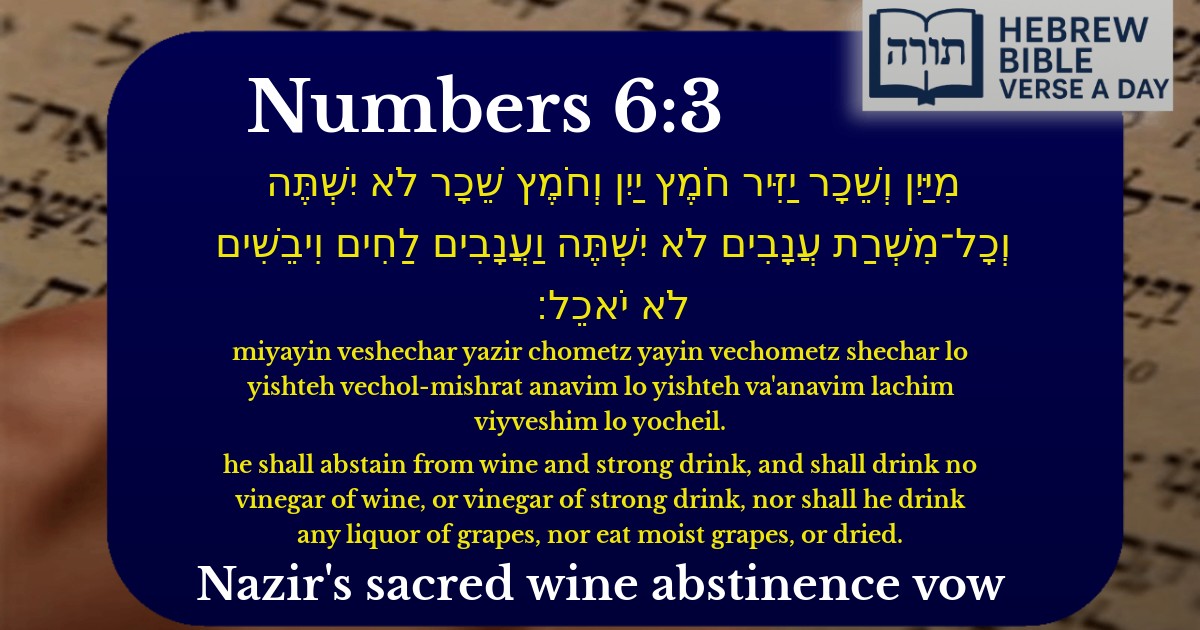Join Our Newsletter To Be Informed When New Videos Are Posted
Join the thousands of fellow Studends who rely on our videos to learn how to read the bible in Hebrew for free!
Hebrew Text
מִיַּיִן וְשֵׁכָר יַזִּיר חֹמֶץ יַיִן וְחֹמֶץ שֵׁכָר לֹא יִשְׁתֶּה וְכָל־מִשְׁרַת עֲנָבִים לֹא יִשְׁתֶּה וַעֲנָבִים לַחִים וִיבֵשִׁים לֹא יֹאכֵל׃
English Translation
he shall abstain from wine and strong drink, and shall drink no vinegar of wine, or vinegar of strong drink, nor shall he drink any liquor of grapes, nor eat moist grapes, or dried.
Transliteration
Miyayin veshechar yazir chometz yayin vechometz shechar lo yishteh vechol-mishrat anavim lo yishteh va'anavim lachim viyveshim lo yocheil.
Hebrew Leining Text
מִיַּ֤יִן וְשֵׁכָר֙ יַזִּ֔יר חֹ֥מֶץ יַ֛יִן וְחֹ֥מֶץ שֵׁכָ֖ר לֹ֣א יִשְׁתֶּ֑ה וְכׇל־מִשְׁרַ֤ת עֲנָבִים֙ לֹ֣א יִשְׁתֶּ֔ה וַעֲנָבִ֛ים לַחִ֥ים וִיבֵשִׁ֖ים לֹ֥א יֹאכֵֽל׃
מִיַּ֤יִן וְשֵׁכָר֙ יַזִּ֔יר חֹ֥מֶץ יַ֛יִן וְחֹ֥מֶץ שֵׁכָ֖ר לֹ֣א יִשְׁתֶּ֑ה וְכׇל־מִשְׁרַ֤ת עֲנָבִים֙ לֹ֣א יִשְׁתֶּ֔ה וַעֲנָבִ֛ים לַחִ֥ים וִיבֵשִׁ֖ים לֹ֥א יֹאכֵֽל׃
🎵 Listen to leining
Parasha Commentary
📚 Talmud Citations
This verse is quoted in the Talmud.
📖 Nazir 4b
The verse is discussed in the context of the laws of a Nazirite, particularly regarding the prohibitions on consuming grape products.
📖 Nazir 5a
Further discussion on the specifics of what a Nazirite is forbidden to consume, referencing the verse to clarify the prohibitions.
📖 Nazir 37a
The verse is cited in a broader discussion about the vows and restrictions of a Nazirite, emphasizing the strictness of the prohibitions.


Context of the Verse
This verse (Bamidbar 6:3) outlines the restrictions for a Nazir—an individual who takes a vow of nezirut to abstain from certain worldly pleasures for a period of time. The Torah specifies that a Nazir must refrain from all grape-derived products, including wine, vinegar, and even fresh or dried grapes.
Prohibitions of the Nazir
Spiritual Significance
The Midrash (Bamidbar Rabbah 10:8) teaches that the Nazir’s abstention from wine symbolizes a higher level of kedushah (holiness), distancing oneself from physical indulgence to focus on spiritual growth. The Sefer HaChinuch (Mitzvah 377) adds that this restriction serves as a safeguard against frivolity and improper behavior, as wine can lead to moral laxity.
Halachic Implications
According to the Shulchan Aruch (Yoreh De'ah 203), the prohibition applies only to grape-derived products, not to other fruits or beverages. The Mishnah (Nazir 6:1) further discusses cases where a Nazir inadvertently consumes these items, requiring atonement and, in some cases, restarting the nezirut period.